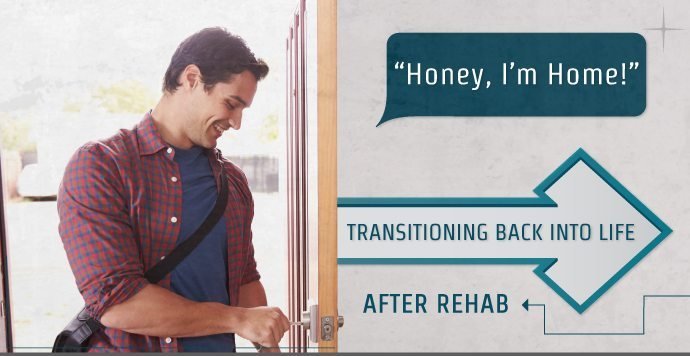“Honey, I’m Home!” — Transitioning Back Into Life After Rehab

Early June, 2011: I had only recently completed my sixty-day stay at an inpatient rehabilitation facility. That was after I had finished my initial stay of thirty days. The counselors and professionals had recommended that I stay the extra two months after the first phase of my recovery. Since I was facing some fairly serious legal issues, both my wife and my lawyer suggested I take the advice.
And my opinion? Well, I thought I was done after thirty days and I was chomping at the bit to return home. However, when both your lawyer and your wife say you should do something—you probably should do it.
I did. I’m grateful that I took everyone’s suggestion. The whole ninety days gave me the time away from the drugs and alcohol that had a stranglehold on my life.
When I got out, I would have impressed even a meteorologist—the “pink cloud” I had swooning over my head was a mile wide. This so-called “honeymoon period” is common for people re-entering society, especially after an inpatient stay with many restrictions. Its characteristics are extreme optimism and a belief that everything is wonderful.
After treatment, I headed into a sober-living environment. For me, this meant I’d be living in a house with four other guys. Luckily for me, I’d have a private room. It was good news, because I don’t deal well with snorers!
Introducing
virtual care
Get treatment when
and how you need it.
Just being back in public places felt weird—and exciting! It’s odd to feel excited to be able once again to enter a gas station and buy a candy bar, but that’s what it was like for me. In fact, everything felt new and exciting: walking down a street, looking for a job, calling my spouse whenever I felt like it (instead of having to wait in line, as well as only call at specifically designated times at rehab). Everything was peachy keen. I finally felt like I could do the “sobriety” thing.
Except that life continues to be life and the pink cloud doesn’t last.
Because—let’s face it—life is . . . well, life. Daily stress and worries continue to keep flowing—perhaps not so much for the person in treatment, but definitely for the rest of their family, friends, and loved ones.
Inpatient treatment separates the person addicted to alcohol and/or drugs from their family, friends, bosses, colleagues, and less savory types like dealers or drinking buddies for a very good reason: namely because the risk of relapse is greatest in the first thirty days. Generally, short-term rates of remission (complete abstinence from mood-altering substances) only fall in the 20-30% mark for most individuals for the first thirty days.
However, treatment has also to address the issues of why a person uses drugs or alcohol in the first place. The goal is to re-integrate the person back into his or her family/job/social life.
What aspects does treatment address for a patient’s re-entry? Below I’ll give you a bit from my re-entry experience, and also speak to what families can expect from their loved one after he or she “gets out.”
The Pink Cloud Doesn’t Last
After the initial excitement of regaining a life that had almost been lost, the shock of reality hits you. And it can hit hard.
You have bills to pay. You have a spouse, a family, or a girlfriend or boyfriend back home. You have either lost your job or you need to re-enter back into work, now as a sober person.
Add to all that the fact that you still need to deal with staying sober, and life suddenly doesn’t seem exciting as it once did right when you got done with treatment. During this time, the honeymoon period of a person’s new life gradually ends. It’s not a matter of if but when.
For me, it was about six months from my sobriety date when I began to settle in. In some ways, it was a sad and stressful transition for me because I had to reassess what priorities I had made and the new ones I needed to embrace.
One of those priorities was my family.
The Family Is In Recovery Just As Much As The Patient Is
This saying from Al-Anon, the popular Twelve-Step group for family and friends of those affected by another’s drinking, is spot on about your recovery:
You didn’t CAUSE it. You can’t CONTROL it. You can’t CURE it.
I think if I had a time machine and I could return to July 2011 and have a nice chat with myself, I think I’d suggest to “2011-Dan” this vital point—the family needs an adjustment period with him just as much as he did with himself in recovery.
A person who has recently gone through treatment needs to understand the difficulty that significant others, kids, parents, friends, co-workers, and everyone else had while the person was absent. Addiction, after all, is a major illness. Make no mistake, it can and will kill you if you don’t address it and thousands every year die.
What I didn’t realize is that codependency is the silent, soul-killing partner to addiction. Looking back in that first year, I know my wife and I nearly came to leaving each other several times. If it hadn’t been for the work both of us were doing with each other—and for ourselves—I wouldn’t be married to her today.
I’m grateful that I am still married to her, but it took plenty of work.
PAWS Sucks, But It Does (Finally) Go Away
PAWS or Post Acute Withdrawal Syndrome is real. And let me tell you . . . it stinks!
For my third (and hopefully final) treatment, and also the one I referred to above, my acute withdrawal from benzodiazepines and alcohol was the most severe—the first month I barely got any sleep. I was also withdrawing from opiates, but with a buprenorphine-taper, it was much more manageable than the other drugs. (A good thing, too—opiate withdrawal is torture. This infographic is the best I’ve seen describing the hell of coming off those drugs.)
Some people don’t experience the difficulties of PAWS, but I sure did. My sleep patterns didn’t normalize until after about six to seven months. But getting a restful night’s sleep wasn’t the worst part. I think the mood swings claimed the #1 spot for that. The difficulty lay in my inability to have significant insight into how totally off-the-rocker I was behaving!
Since a brain in recovery from addiction is trying to establish a new level for neurotransmitters to function without chemicals, a person discovers that massive mood swings become the norm for daily existence. Life with such a person, I’ve come to understand, is like trying to live with a tornado in your living room. My wife has reminded me of the screaming sessions and the drama that ensued in the months following my exit from the sober house.
Lest you read that I’m still the drama queen on the highest throne, I’m not. It took a while, but my brain finally stabilized and the drama began to subside. I credit my survival during those difficult months much to the psychiatrist I was seeing, and, of course, also the Twelve Step support group I was attending.
Of course, with you or someone you know, your mileage will vary.
Just know this . . . it does get better. Life eventually resumes. I wouldn’t trade my life in long-term recovery today for anything!




